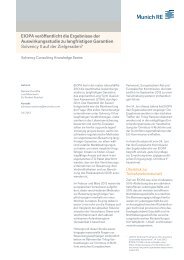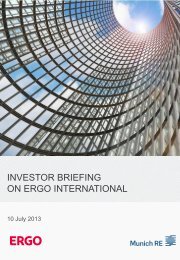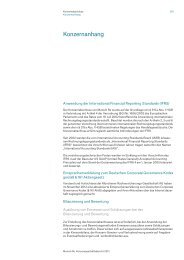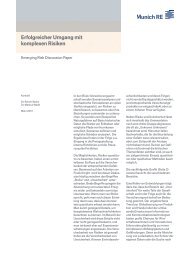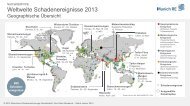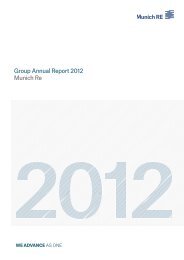Munich Re Group Annual Report 2006 (PDF, 1.8
Munich Re Group Annual Report 2006 (PDF, 1.8
Munich Re Group Annual Report 2006 (PDF, 1.8
You also want an ePaper? Increase the reach of your titles
YUMPU automatically turns print PDFs into web optimized ePapers that Google loves.
<strong>Munich</strong> <strong>Re</strong> <strong>Group</strong> <strong>Annual</strong> <strong>Re</strong>port <strong>2006</strong><br />
Pressure is put on us to deliver on our strategies each and<br />
every quarter. But if you are really interested in our enduring<br />
results, this is misleading. Our business model has a<br />
much longer perspective and is a more sustainable one.<br />
That’s why we made the issue of climate change and its<br />
risks public back in the seventies, as we felt that it was<br />
something of outstanding future importance. Climate risks<br />
were and are emerging in unprecedented dimensions. We<br />
are risk-scouts – that’s where perseverance and innovation<br />
are needed in equal measure. Back then, we were a voice<br />
crying in the wilderness. Climate change wasn’t fashionable<br />
at all. Now, 25, 30 years later, climate change is a topic<br />
high on the agenda everywhere. This is just one example<br />
of the type of situation in which I, in my leadership position,<br />
feel regularly challenged. People devote a great deal of<br />
attention to fashions, even to hype, whereas we at <strong>Munich</strong><br />
<strong>Re</strong> are long- or at least medium-term-oriented: we may not<br />
have the same “sex appeal” as, for instance, competitors<br />
who are interested in action only for action’s sake. Employees<br />
may get nervous and say: “Others may overtake us;<br />
they follow the trend and we look boring by comparison.”<br />
Kent Nagano_ “Fashionable” is by definition something<br />
that does not last. One should say that conviction<br />
and will touch humans as a kind of life force that can<br />
sometimes be completely uncoordinated with the natural<br />
rhythm of fashionable cycles and may take some dramatic<br />
6<br />
forms. Think of Ludwig van Beethoven’s great ninth symphony.<br />
When it was premiered, the audience was bewildered<br />
that the great and cherished master could write<br />
something so seemingly incoherent. The critics were<br />
unable to understand the depth of Beethoven’s achievement.<br />
Because after the long period between the eighth<br />
symphony and the ninth symphony, people were expecting<br />
and waiting for something tremendous and enlightening<br />
to come. What did arrive was so visionary that it was<br />
apparently incomprehensible. Beethoven died before the<br />
ninth symphony was accepted as a universal statement. It<br />
is such an inspiration to us all that it managed to become<br />
a recognised masterpiece and has remained so over time.<br />
Beethoven had a very profoundly rooted conviction. If you<br />
look at it from the perspective of several hundred years,<br />
you can see that it broadened people’s concepts of what<br />
music is and can be. But in Beethoven’s lifetime the symphony<br />
was never “fashionable”.<br />
Nikolaus von Bomhard_ My experience is that if you<br />
lead or run an organisation and you have a long-term<br />
vision, one thing is indispensable: you must communicate,<br />
explain – and convince. Only if as many people as possible<br />
share your view, will this build the momentum that you<br />
need to remove obstacles. In addition, your vision must<br />
of course be based on some sort of hard experience and<br />
know-how. From that, you derive the power of conviction.



